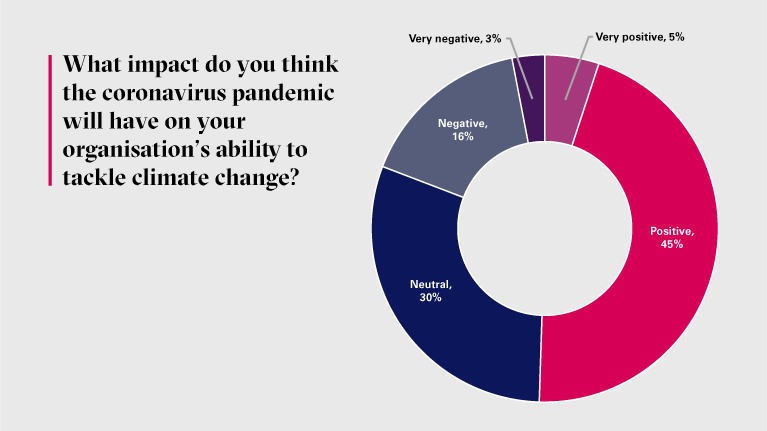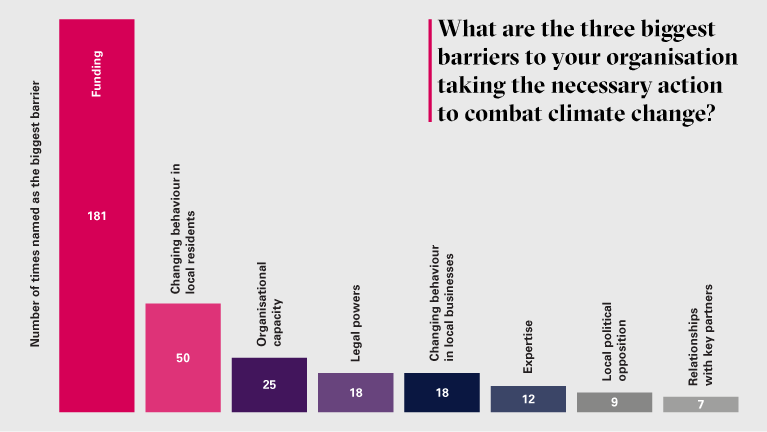The last few months have been an exceptionally challenging time for local government. Despite this, 356 officers and councillors took the time to complete a climate change survey that we conducted in association with LGC. We would like to thank them all for their contributions, which have shown that tackling the ongoing issues of climate change is still a top priority for the sector.
There was rising awareness of the climate emergency and growing public support for action before the pandemic, but now this huge event has changed economies, everyday life and societal behaviour across the world. (Refer to Figure 1 below showing what impact officers and councillors feel coronavirus will have on local government's ability to tackle climate change.)
The pandemic, for all the momentous disruption and tragedy, has given us at least a glimpse of what can be achieved when we are effectively forced into action. This has encouraged climate change activists, and at the very least opened most people's eyes to possibilities previously dismissed without much care. Some things that previously seemed unthinkable, or at least far too difficult, are now out in the open. Do we really need to commute to city centre offices? Do we need to fly so often? How do we maintain the cleaner air we are experiencing in dense urban places?
But for all the great inspiration and desire to change that the survey suggests are out there, the key barrier comes across loud and clear: money. (Refer to Figure 2 below showing the barriers authorities face in taking the necessary action to combat climate change.)
The narrative has for some time been that climate change is a known and pressing emergency, but even so people are struggling to change their behaviour to a meaningful degree unless forced to do so by law, economically encouraged or otherwise facilitated.
Given that 'green' solutions are often uncompetitive compared with conventional options, whether it is transport, building materials, energy or almost anything else, either production and/or purchase need some form of subsidy to encourage people to change. Again, this comes back to money – while some people will make 'ethical' buying decisions to a small degree and pay more to further a particular cause, this is marginal.
To make substantial changes the only reliable way to change behaviour is by funding it directly, or at least providing financial incentives. When the green solution is the economically advantageous one, or at least the not materially disadvantageous one, people will choose it. Relying on good nature and philanthropy is not enough: public money is needed, from which private money can follow.
This observation takes the conversation back to the pandemic. Not since the second world-war has the public purse seen such pressure. Governments across the world are experiencing incredible demands to finance largely short term measures simply to keep economies going, and to some this hardly seems the time to be looking for yet more money to subsidise green projects.
However this is in fact exactly the time to be investing in green measures. It is often much easier to build up from scratch from something completely broken than to try to evolve as you go along. The current state of flux in the economy is therefore an opportunity.
In the UK, the government is already focusing on pump-priming the economy to get things moving. The Getting Building Fund is about leveraging large scale government support to incentivise the economy into action, starting with immediate "shovel ready" projects. These funds, and others like them, set out to close viability gaps to give the minimum incentive necessary for investment projects to happen.
When the state supports projects it can impose conditions upon the funding it provides to steer chosen policy objectives. For example, the French government's recapitalisation of Air France in the wake of Covid included large scale environmental conditions. The state has an opportunity, when providing vital funding, to impose environmental conditions on whatever it funds. Furthermore the state also has the opportunity to determine what it funds, hence future comparators to Getting Building might be targeted to environmentally-friendly projects only.
Finally, the survey also suggests that there is a willingness and desire to change because of the climate emergency, and that this willingness is probably at an all-time high. This is hugely encouraging, but again the key ingredient to making this happen at a meaningful level is funding.
The state in all its forms – central, regional and local – has the ability, if acting in a coordinated way, to deliver funding to achieve this, both in putting environmental responsibility conditions against funding which it is already providing, and in targeting more future funding specifically towards effective projects that help to combat climate change.
It is clear from our survey results that the goodwill and desire is there, but without public policy leadership and funding this will not be enough to meet the challenge.
Jonathan Branton, Partner and Head of Public Sector will be participating in a panel session entitled 'Funding, legal and strategic policy' at the LGC Climate Change Conference on 17th September. Find out more about the Conference and book your place >
Download our report 'What now for climate change?' How regional and local government is leading the response.















